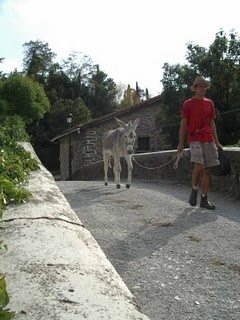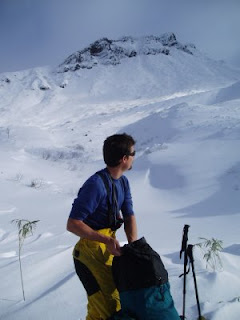If you keep up with my blog, you know that I like to write my own stuff. Today, though, I came across an article on Backpackinglight.com by Simon Clissold. I just had to share with you. Enjoy!:
 Slow travel and the philosophy behind it is nothing new; think Bashō and his bamboo staff on his ‘narrow road to the deep north’ in 1689, or Stevenson walking through the Cevennes with a donkey and a loaf of bread in 1878, or Fermor setting out in 1933 for Constantinople on foot from his home in London with little more than the clothes on his back. An abundance of time is all these men had. What they did not have was a pack full of fancy equipment, a gps, or even a simple map. They understood implicitly not just the well-worn cliché that it’s the journey not the destination that’s important, but on a deeper level they knew that at its core travel is about freedom, about the unexpected; it is spontaneous, flexible and above all open to what ever may come, an unscripted adventure full of not only new places but also of new people, new friendships, new ways of looking at the world.
Slow travel and the philosophy behind it is nothing new; think Bashō and his bamboo staff on his ‘narrow road to the deep north’ in 1689, or Stevenson walking through the Cevennes with a donkey and a loaf of bread in 1878, or Fermor setting out in 1933 for Constantinople on foot from his home in London with little more than the clothes on his back. An abundance of time is all these men had. What they did not have was a pack full of fancy equipment, a gps, or even a simple map. They understood implicitly not just the well-worn cliché that it’s the journey not the destination that’s important, but on a deeper level they knew that at its core travel is about freedom, about the unexpected; it is spontaneous, flexible and above all open to what ever may come, an unscripted adventure full of not only new places but also of new people, new friendships, new ways of looking at the world.
Technology, inherently or otherwise – and I will try to leave my Luddite bias out of this – has a way of putting up barriers between us, the world we live in and the people and animals that inhabit it. The car is the ultimate example of the de-humanizing effect of modern technology, and also a major factor in the decline in the art of slow travel.
When Monsieur Theophile Gautier (A Romantic in Spain, 1840) wrote ‘What constitute the pleasures of the traveler are obstacles, fatigue or even danger. What charm can there be in a journey when one is always sure to arrive and find his horses ready, a downy bed, an excellent supper and all the comfort one enjoys at home? One of the great misfortunes of modern life is the absence of the unexpected, the lack of adventure. Everything is so well regulated, so well fitted into its place and ticketed, that chance is no longer possible; another century of improvements, and everybody will be able to foresee from the very day of his birth all that will happen to him up to the day of his death’, he anticipated the decline and fall of slow travel, which began with the railways and was completed with the automobile.
which began with the railways and was completed with the automobile.
Slow travel is about the unknown. There can be no guide book for the slow traveler, nor fixed itinerary nor list of things to ‘see’. Slow travel has this benefit also: traveling at a human pace, humans are more open to you. You are non-threatening, safe and approachable. You have the time, and inclination, to smile. And others will smile back, and doors which are impossible to see when traveling at speed, are open and welcome for you when traveling slowly.
My introduction to slow travel was a backpacking trip I took when I was 20 to Nepal. We set out light: no tent, no stove, no maps, no guide, no porter. A few books, sleeping bags, some warm clothes, a camera and a huge wad of low denomination Nepalese rupees made up the entire load of my partner and I.
We made it 30 days without crossing a single road, seeing a single TV or ever drinking water from a tap. Sometimes we were cold, or hungry, or lost, but more often we were being invited to eat a delicious dhal at someone’s house, or huddled around a yak dung fire sipping tea, or laughing with a farmer struggling to explain the route to us using the universal sign language of directions.
I finished that trip with a profound respect for the Nepalese people, their generosity of spirit and their ever smiling countenance. And I knew that I experienced a Nepal I would never have seen if I had of been cooped up in my tent in the evenings, or led from guest house to guest house by a guide, or was following a strict itinerary dictated by time constraints. Nepal gave me a taste of Slow which has colored all the adventures I have had since, a taste of the possibilities of traveling light, and traveling with time.
I followed my slow traveling passion, and learned how different a continent can look while moving slowly, a few years later while walking with a donkey from Seville in southern Spain to the French Alps. People trusted me; a man with a donkey cannot make a fast get away. People talked to me; a man with a donkey may be interesting. People helped me; a man with a donkey might need a place to sleep, some food for his animal, some advice on the best path to follow through the fields.
 Because I had no fixed route – I was merely heading in a general north or north easterly direction – I had no pre-conceptions of what I may find along the way. Thus the littlest things, like a tiny medieval hamlet or a distant snowy peak, were wonderful surprises for me. Put simply, with no expectations I suffered no disappointments. With time available to me, I followed any path which took my fancy, or went precisely nowhere when the urge took me.
Because I had no fixed route – I was merely heading in a general north or north easterly direction – I had no pre-conceptions of what I may find along the way. Thus the littlest things, like a tiny medieval hamlet or a distant snowy peak, were wonderful surprises for me. Put simply, with no expectations I suffered no disappointments. With time available to me, I followed any path which took my fancy, or went precisely nowhere when the urge took me.
To some, the donkey represents a burden, the antithesis of traveling light. To me, however, the donkey, like the bicycle or the canoe, is a liberating means of travel, giving me the freedom to explore and experience a place on its own terms and in its own time. Slow travel and traveling light have this in common, a mental attitude, an open, flexible, responsive approach to the world which is just as important as what is in your backpack or on your donkey or in your canoe.
More recently I set out on a journey from England across Europe on bicycle. There is something inherently pleasing about walking out the door to begin a journey powered completely under your own steam. Whether this journey be simply a two mile walk to work or a four month bike trip across a continent, the satisfaction of being independent and reliant solely on yourself is, for me at least, a reason in and of itself to walk or ride or row. The means, like all worthy means, are an end as well.
The beginning of my trip was for me a perfect affirmation of my slow travel, and general slow living, philosophy. 20 minutes after leaving my house, I found myself waiting in front of a long line of morning traffic at a red light in the middle of Oxford, when a fellow cyclist pulled up beside me.
We struck up a conversation, as two human beings are wont to do when not cut off from each other by a noisy, smelly, metal cage. He was from Germany, studying in Oxford, and was enjoying a last ride into the Oxfordshire countryside before he had to return home. He was in high spirits too, and who wouldn’t be on such a fine spring day with such a pleasing morning’s ride in front of you?
After a conversation touching on student life in Oxford, our favorite watering holes, and the likely hood of a puncture on my first day of the trip, we parted with a friendly ‘good luck’, and already I had experienced the most enjoyable wait in traffic for a green light in my life, and made exactly one more friend then I had ever made in 13 years of sitting in the aforementioned metal cage.
If my slow travel philosophy needs any more justification, the final argument is the obvious: environmental. I tend to agree with Jonathon Porrit, who wrote recently that he’s ‘increasingly persuaded that speed may in itself be as much the enemy of a sustainable future as the reckless consumption that powers our global economy.’ Speed, coupled with reckless consumption, is at the heart of almost all modern travel, and this combination has had a deadly effect not just on the natural world but also on the human: the decline of traditional cultures, the spread of (American) cultural hegemony etc.
Slow travel engages with, and participates in, the life around it. The slow traveler is not apart from their surroundings; they are vulnerable and open to them, they respond to the world, rather than the expecting the world to respond to them. Time is the key to this, and as Carlo Petrini, one of the great slow activists said, ‘we have lost our sense of time……We believe that we can add meaning to life by making things go faster. We have an idea that life is short – and that we must go fast to fit everything in. But life is long. The problem is that we don’t know how to spend our time wisely. And so we burn it…Ultimately, “slow” means to take the time to reflect. It means to take the time to think. With calm, you arrive everywhere.’
Citation
“Slow Travel,” by Simon Clissold BackpackingLight.com

John
Thanks so much for posting this article. I first read it a month or so ago, and it struck a chord in my soul. A soul in which I’ve noticed a slow mutiny building against the increasing pace of my life. I’ve been riding my bike to work most days since then, and while moving at a ‘human pace’ can be a little unnerving on Johnston St., it’s been a great experience. I love the Petrini quote at the end: “…life is long. The problem is that we don’t know how to spend our time wisely.” So true. Thanks for the encouragement to slow down.